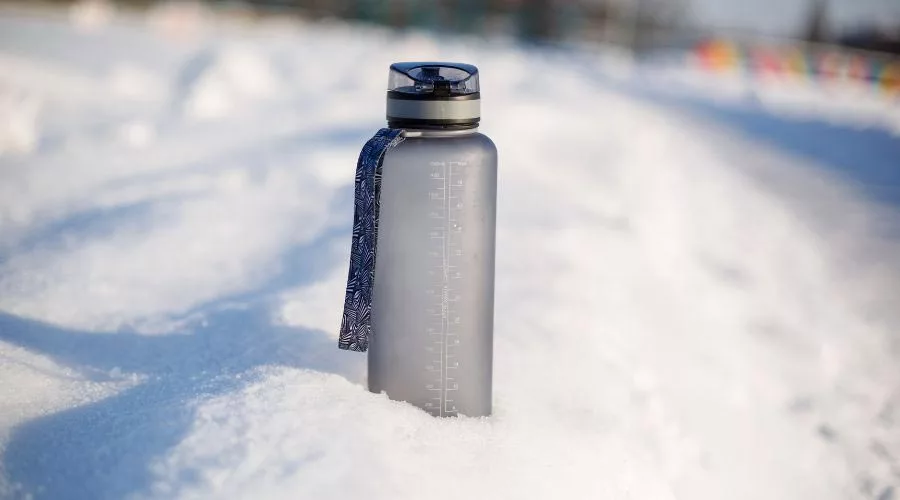One of the most frequent issues campers encounter during wintertime is the quick freezing of the water they store. And it can be dangerous to some extent, leading campers to face dehydration issues.
Therefore, knowing how to prevent water from freezing during winter camping is crucial. You will undoubtedly have a better camping experience in the winter if you can ensure safe water storage.
However, to help you narrow down all the challenging aspects and get over them, this article provides some critical suggestions on how to keep water from freezing during winter camping.
Here’s all you need to know,
Table of Contents
1. Insulate Your Water Bottles
Insulating your water bottles could mean the difference between staying hydrated and being thirsty all day long. That’s why it’s crucial to ensure your water bottles are adequately insulated.
There are many different ways to insulate your water bottles, but one of the best is to use an insulated sleeve.
Insulated sleeves help keep your water from freezing as well as safe from getting exposed to the elements.
2. Use a Thermos
Whether car camping in the winter or backpacking in the backcountry, a thermos can come in handy to keep your water from freezing. Here are a few tips on how to use one:
Fill your thermos with hot water before you go to bed, and seal it tightly. It will avoid the water freezing overnight.
If you’re backpacking or worried about the water freezing during the day, carry the thermos in an insulated sleeve or pack.
Use a thermos specifically designed for winter camping. Some thermoses have double walls and are vacuum insulated to prevent freezing water.
To avoid having frozen thermos, keep them close by or inside your sleeping bag.
If you’re using a metal thermos, make sure to put a layer of clothing between you and the thermos to prevent burns.
3. Cover Your Water Bottle with Snow
No matter how well insulated your bottle is, the water inside will eventually turn to ice if the temperature outside is low enough. However, a quick fix is to cover your water bottle in the snow.
It might seem counterintuitive, but the method works great. The snow will act as an extra layer of insulation, keeping the heat from escaping and preventing the water inside from freezing.
This trick works even if your water bottle is only partially full – as long as there’s some snow on top, it will do its job.
4. Bury the Water Container in the Ground
The ground is an excellent insulator. It means that it takes longer for cold temperatures to travel through the ground than it does through air.
So, by burying your water container in the ground, you are effectively slowing down the rate at which the water can freeze.
Another reason why this method works are because of evaporation. When water is exposed to the air, evaporation causes the water to cool down quickly.
However, when water is buried in the ground, evaporation is slowed down, which helps keep the water at average temperatures for longer.
So, if you’re looking for a way to keep your water sources from freezing during cold winter days, consider burying your water container in the ground.
5. Get Your Hot Water Bottle
Another proven technique to keep water from freezing during winter camping is using a hot water bottle.
Because winter camping days tend to be colder, it’s only sensible to carry hot water bottles. These bottles offer extra insulation and withstand heating conditions to prevent your water from getting frozen.
So, ensure you buy a couple of hot water bottles before heading out for your next winter camping trip.
6. Use Water Additives
Water additives are chemicals you add to your water to help prevent it from freezing.
Some water additives can help to prevent freezing, while others can help to make the water denser so that it takes longer to freeze.
One type is Antifreeze. Antifreeze work by lowering the freezing point of water, which means that your water will take longer to freeze.
Another type of water additive is a deicer. Deicers work by breaking up the ice that has already formed in your water. It can help prevent your water from freezing solid.
You may also use natural water additives like vinegar or any solute. Each has its benefits and drawbacks, so research before deciding which one is right for you.
7. Use a Wide Mouth Water Bottle
Using a wide-mouth water bottle has numerous advantages over a narrower one. But, one of the most important reasons to use these bottles is that the water inside is less prone to freeze, making them excellent for cold weather.
These water bottles allow the air to circulate freely around the water and keep it from freezing quickly. Plus, they’re easier to fill and clean than narrower-mouthed bottles.
So if you’re looking for a bottle that will keep your water cold in cold weather, a wide-mouth water bottle is the way to go.
A Few Additional Things to Consider
- Camp near a riverside or lake. In winter camping, it is crucial to have a water supply that won’t freeze. For this, a camp by a river or lake is suitable. It will make it simpler to get water as necessary.
- Keep a heater to warm up both your tent and water containers. It will prevent your water bottle from freezing and becoming an icebox. Place the heater near the centre of the tent so the heat will be evenly distributed.
- Carry your water bottle near your body, as your body heat can ensure the water bottle stays at an optimum temperature from freezing. And, if you do happen to get cold, the water can help to warm you up from the inside out. Just make sure you sip it quickly before it freezes!
Conclusion
Winter camping is a fun way to escape the chill of autumn and spring, and summer can be too hot to enjoy. But outside temperatures can dip below freezing and, without the right gear, water in your tents could freeze.
So, in this article, we shared some of the crucial tips on how to keep water from freezing during winter camping.
With detailed instructions and all the viable remedies that would work, We tried to provide you with the finest solutions to keep your water from freezing in cold temperatures.
Now that you know how to prevent water from freezing during winter camping, eliminate all the worries and make your winter adventures much more enjoyable.



